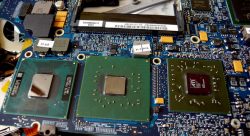 It is extremely important to stop your computer from overheating and allow it to work at a safe temperature for maximum productivity and safety. Your computer contains many working parts and each of these generates a lot of heat when the system is on. There may be different signs your computer will show when it is overheated. Shutdowns, blue screen and freezing are some of the issues that are caused by overheating.
It is extremely important to stop your computer from overheating and allow it to work at a safe temperature for maximum productivity and safety. Your computer contains many working parts and each of these generates a lot of heat when the system is on. There may be different signs your computer will show when it is overheated. Shutdowns, blue screen and freezing are some of the issues that are caused by overheating.
Role of the Cooling System in a Computer
The cooling system of your computer is considered one of the most important parts of the computer. Without an effective cooling system, the computer’s electrical components will not function properly. Overheating occurs when the cooling system is not efficient enough and it can cause serious damage to your system. Therefore, it is very important that you should stop your computer from overheating and keep everything under control for safe working conditions.
Problems Caused by an Overheated Computer
An overheated computer can damage the hardware inside your system. When your cooling system stops working, heat increases and it starts destroying your hardware. The performance of an overheated computer is lower than the performance of a normal computer. Hence, it is very important for you to make sure that your computer is working under normal temperature at all times.
Steps to Stop Your Computer From Overheating
You can take some additional precautionary steps to stop your computer from overheating. A few of these are discussed below.
Always keep the computer case closed: Even though it seems that running your computer with the case open will provide more ventilation and thus help cooling, it will result in more accumulation of dust in between the fans and cause overheating of your computer. So you should always keep the computer case closed.
Keep the system clean: Keeping your system free from dust particles is the first step to stop your computer from overheating. Dust particles get stuck in between the cooling fans inside your system. Dust particles restrict air flow, raise the temperature and prevent heat from going out. Therefore, it is advised to clean your system once a month to remove the dust particles and stop your computer from overheating. Commercially available computers have fans installed that are deemed adequate for cooling your computer. However, if they get overtaken by dirt, they can’t do their job.
Proper Ventilation: You should make sure you keep the system where there is proper ventilation. If it is a desktop, do not keep it too close to the wall and if it is a laptop, do not put it on a mattress or pillow. By ensuring proper ventilation, you can stop your computer from overheating.
Checking Fans are working: You should check fans regularly to see if they are working correctly. When the fan stops working, it will lead to an increase in temperature.
Tune-up heat sink: When the heat sink is not in a proper position or when the thermal paste is old, a CPU will get heated up quickly. You should remove the old thermal paste and apply fresh thermal paste. You should also place the heat sinks in correct positions to reduce temperatures. By doing this, you can ensure that enough heat is dissipated to stop your computer from overheating.

 Email article
Email article



